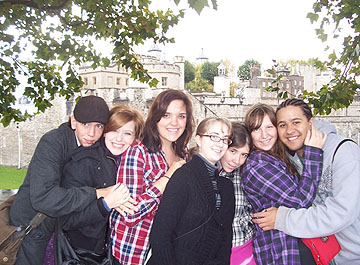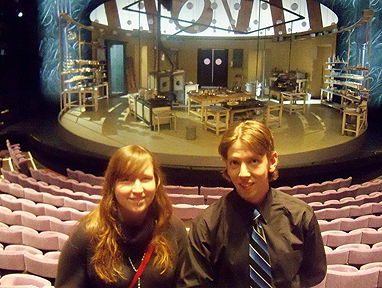Literature came alive to a group of Tusculum College students as they traveled to London and were able to see settings of some of the most important works of 19th century British authors.
Students in the “19th Century British Literature” course traveled to London Oct. 27- Nov. 2 accompanied by their professor for the course, Dr. Shelia Morton, assistant professor of English. The trip was the first airplane trip for some of the students and the first international plane trip for most of the seven students who went. The students gave a presentation about their trip on Monday, Jan. 16.
Arriving after an overnight flight to London, the students settled into the hostel that would be their home during the trip and faced the challenge of trying to stay awake for the remainder of the day to adjust to that time zone.
They visited the National Gallery and Green Park and saw Buckingham Palace, Big Ben and the London Eye as they explored London on foot. They went to Picaddilly Circus.
The students visited the Tower of London, which was built as a fortress and stronghold and also served as a royal residence and a prison. Michelle Hoover said the group’s guide, Jimmy, was excellent, and the students were interested to learn that an individual had to serve in the military for several years to qualify to be a tour guide and live within the Tower.

In front of the London Tower are Tusculum students, Andrew Baker, Bonnie Parks, Angel West, Michelle Hoover, Courtney Broderick, Valerie Harrell, and Zackery Elliott.
A day trip to Stonehenge, Salisbury and Bath was taken by the students. “It was beautiful, the scenery itself,” said Andrew Baker of the area around Stonehenge. “There was nothing but rolling green hills and sheep, lots of sheep.” Stonehenge itself was disappointing to some of the students because visitors are not allowed to go very close to the stone circle.
The students enjoyed exploring the streets of “ancient” buildings in the city of Salisbury, the home of author William Golding, and all enjoyed the trip to Bath, a popular high society destination in the 1800s and the setting for much of Jane Austin’s novel, “Persuasion.” “It was my favorite city,” Baker said.
Exploring some of the places authors frequented and places used as settings in their books was the main focus of the trip.
Oscar Wilde was the focus one day as the students visited various sites related to the playwright with a guide who is one leading experts on the British writer. This was Valerie Harrell’s favorite day because Wilde is one of her favorite authors and at the end of the tour was selected by the guide for a photo.
Sites related to Charles Dickens’ and his writings were part of another day. As part of the Dickens tour, the students went to sites that Dickens used as settings in his books. For example, Dr. Morton said that the guide took them to see a house that was used as a setting in “Martin Chuzzlewit.” “It really brings to life having been there,” she said. The students also visited the debtor’s prison where Dickens’ father was imprisoned and his family lived during his childhood.
While in London the students read Dickens’ “Oliver Twist” and a history of 19th century London. The students said they read at every available opportunity, whether it was waiting on transportation or a spare moment in the evening.
The Victorian era in London was the focus of the “Darkest Victorian Walk” that the students took on Halloween. They saw some of the sites where charities were created to help the desperately poor who lived in London at the time. They learned about the members of the wealthy class who started these charities because the government did not provide support to the poor.
Sites related to Shakespeare were also on the itinerary, and the students visited the replica of the Globe Theatre.
The students found Londoners to be friendly once they were engaged in conversation. Baker said that people on the streets did not make eye contact or speak to one another. “You had to break their focus to get them to speak to you,” he said, adding that atmosphere of individuality could benefit a writer.
Pubs, which the students described as more like restaurants than bars, are the places people make connections. Dr. Morton said that is why the pubs are so important in British life, because they are the places where social connections are made.

Tusculum College students Valerie Harrell, left, and Andrew Baker pose in front of the set for the play, “The Kitchen” at the National Theater.
One evening the students went to the National Theater to see the play, “The Kitchen.” Baker said the set, which depicted a restaurant kitchen, was amazing and featured appliances that operated. “It was one of the best plays I have ever seen,” he said. “I rediscovered my love for theater that night.”
The trip was the first international one taken by Tusculum students during the 2011-12 academic year. A group of students are currently on a trip with stops in Germany, Austria and Switzerland, and a trip to Malta for business and political science students is planned later this year. Dr. Morton is planning another British literature trip to England in 2013.


